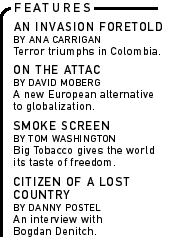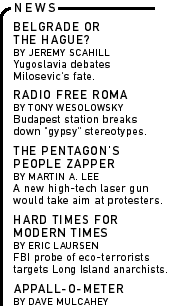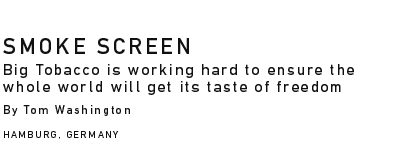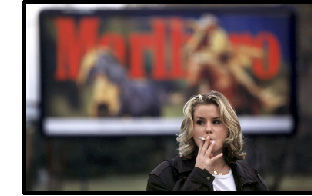

|

|

|

|
| |
 |
|
|
Fuhlsbttel airport is a smoky place. Outside customs, a 10-foot statue of the Marlboro Man appears through the haze. He's neon lit and sports full cowboy regalia: Stetson, chaps, studs and a lasso at his hip. A branding-iron font over his head reads, "Taste the Freedom. Come to Marlboro Country." At first glance, he appears no different than any of the thousands of twisted promotional images that fragment our attention spans every day. Here in Hamburg, though, the Marlboro Man seems strangely out of place, a kitsch icon of another age. America may have driven the Marlboro Man out of town, but he's riding high in the rest of the world. Around 35 percent of German adults smoke. The country has one of the highest smoking rates in Europe, just behind the two leaders, Poland and Russia. And Germany's love affair with tobacco and the Marlboro man doesn't seem to be waning, either. In 1998, the German Parliament defeated a bill that would have placed heavy restrictions on cigarette advertising and smoking in public areas and the workplace. Currently, Germany has no national tobacco control legislation. When the Berlin Wall crumbled in 1989, Phillip Morris was one of the first major
In the Czech Republic, for example, Phillip Morris made a successful $413 billion dollar bid for AS Tabak, the state cigarette monopoly, gaining a firm hold on sales in Central Europe for decades to come. This 1992 venture was the largest single U.S. investment in a former Eastern Bloc country that year. Hamburg-based Reemtsma Tobacco, No. 4 among the world's major tobacco producers, was right behind them. Foreign business now accounts for more than 75 percent of Reemtsma sales, with markets in Asia and Central and Eastern Europe taking the lion's share. Last year the company's sales outside of Germany exceeded the 100 billion-cigarette mark for the first time. Other numbers from the tobacco industry are on the rise as well. The World Health Organization (WHO) estimates tobacco use is killing 4 million people a year worldwide. If left unchecked, the WHO reports the death toll will climb to 10 million annually by the year 2030. Seventy percent of these deaths will be in developing countries. The WHO also reports that by the year 2030 tobacco is expected to be the single biggest cause of death worldwide, outstripping heart disease and HIV by a significant margin. Despite these figures, Big Tobacco still does not accept responsibility for the ruined lives its products have caused. In the United States, the past decade has been a PR nightmare for Big Tobacco. Growing consumer awareness about the harms of tobacco addiction and the simultaneous attempt by the tobacco companies to withhold damaging health-related evidence about their products resulted in a slew of billion-dollar lawsuits. Particularly damaging were last year's $145 billion class-action lawsuit in Florida and Minnesota's $6.1 billion settlement in 1998, which opened thousands of Phillip Morris documents to public scrutiny. The subsequent drop in tobacco sales in the United States and government-imposed restrictions on cigarette advertising have forced Big Tobacco to assume a different marketing approach. The most visible change has been their apparent willingness to negotiate. Rather than assuming the familiar defensive stance about their products, they say they're ready to support FDA regulations. At Phillip Morris, this about-face in PR policy includes a $100 million makeover campaign, in which it's portraying itself as a benign player in the global village under the guise of Kraft Foods, "corporate citizenship" and its "Youth Smoking Prevention" program. Will the makeover work? Ray Rogers, director of the Corporate Campaign and an expert on consumer boycotts thinks not: "Phillip Morris having a bad reputation is not news, but the failure of a comprehensive and expensive public relations campaign to change people's minds reveals an irreversible credibility problem. It is doubtful that any PR firm could improve this corporation's image, based on its horrible record of destroying millions of people's lives, which it continues to do. Phillip Morris took a gamble by highlighting its ownership with Kraft and has inspired widespread consumer revolt." This anti-smoking campaign has now spread beyond U.S. borders. INFACT, a Boston-based corporate watchdog, led the effort to form the Network for Accountability of Tobacco Transnationals (NATT), a network of some 50 organizations from 30 countries that pushed the WHO to conduct hearings on the tobacco trade. A WHO panel discovered evidence of efforts to undermine and subvert international tobacco controls. They also found that Phillip Morris had been using its Kraft Foods subsidiary and other branch divisions to influence developing polices abroad to ban the promotion of tobacco products. Documents revealed that tobacco companies had been monitoring the WHO for nearly a quarter century and viewed it as one of their "leading enemies." This evidence was first made public in the Minnesota lawsuit and then presented to the WHO in the Zeltner Report, a Swiss investigation into the tobacco industry's attempts to undermine WHO regulation. One memo from Phillip Morris CEO Geoffrey Bible cited in the report states: "[The WHO] has extraordinary influence on government and consumers and we must find a way to diffuse this and reorient their activities to their prescribed mandate." Bible goes on to say: "There is currently a vacancy in the WHO Food Safety Bureau; they are looking for an industry expert to be 'donated' to the WHO to act as a liaison with business. If there is someone at Kraft/GF who possesses the skills, we should consider offering his or her services." The WHO is now trying to persuade nearly 200 countries to support the Framework Convention on Tobacco Control (FCTC), a treaty that would severely limit tobacco advertising and sponsorship programs in the global marketplace. It also seeks to give governments more control over the tobacco industry, in everything from creating alternative agriculture programs to monitoring all aspects of the industry's activities. "Tobacco corporations, led by Phillip Morris, have been using their political influence across the globe to spread addiction and death," says Lucinda Wykle-Rosenberg, research director for INFACT. "The FCTC treaty is our best opportunity to put public health before tobacco profits." While few people envision the billion-dollar litigation suits witnessed in America over the past few years, many officials hope that some sort of unified, international policy could be put into place as soon as 2003. NATT is optimistic about this uphill battle. But according to a September 2000 article in the Legal Times, the three major multinational tobacco companies--British American Tobacco, Japan Tobacco and Phillip Morris--have "taken their case against the treaty directly to most of the 192 countries involved in drafting the FCTC document." Preventable deaths and disease should be cause enough for each of these countries to take action against Big Tobacco. But tobacco interests have been ingenious in constructing myths about tobacco's place in the global marketplace as a tax revenue generator and job supplier, the sort of things that finance ministers and development agencies love to hear. Any reduced demand for cigarettes, tobacco companies argue, would rapidly cause unemployment and revenue loss. They've argued this point long enough that in many countries it's accepted as conventional wisdom. In the former Eastern Bloc, where many countries are still strapped with severe economic and social problems, turning your back on tobacco isn't so simple. In Hungary, for example, where 40 percent of adults smoke, the government is struggling to fund health services strapped with a 150 percent increase in lung cancer cases among men and a 200 percent increase among women in the past decade. Big Tobacco has stepped in to fund some heath services because it lends government and citizens the impression that they are actively working for the common good. This PR boost may aid Big Tobacco in the coming battle over restrictions such as the FCTC. Britain's Guardian recently reported a story about a small town clinic in Hungary that treated patients for lung cancer and tobacco-related diseases while also accepting sponsorship from British American Tobacco, which operated a cigarette factory just down the street. A similar scenario has occurred in the United States, where multibillion-dollar settlements with state and federal governments result in peculiar circumstances. They helped turn tobacco executives and health advocates into unlikely partners as big tobacco soon became one of the country's biggest underwriters of smoking-related health programs. Other countries in Eastern Europe have reported the same forms of so-called "sponsorship," where tobacco firms pose as a kind of sugar daddy in everything from funding medical research to city parks. Even Switzerland, Europe's icon of government and social efficiency, has reported numerous activities in which big tobacco has thwarted national legislation against advertising. In January, a report by the WHO and University of California revealed that tobacco influence-peddling had reached the Swiss hospitality industry as part of a strategy to thwart measures against smoking in restaurants, work and public places. Subsequently, a pair of national bills to ban cigarette advertising were rejected by Swiss voters in 1979 and 1993. The Swiss government has yet to introduce tobacco advertising bans and smoke-free policies. Despite all of the PR and political maneuvering, Big Tobacco must still work hard to attract new customers because so many of the old ones are dying out. Most of these new recruits are children, the target group of what one recently released Phillip Morris document referred to as "replenishment pools." Ninety percent of those who start smoking are under 20. And while Phillip Morris insists they're trying to prevent youth smoking, company documents spell out a different strategy. In one such document, former Phillip Morris senior vice president Ellen Merlo stated: "If we don't do something fast to project that sense of industry responsibility regarding the youth access issue, we're going to be looking at severe marketing restrictions in a very short time. Those restrictions will pave the way for equally severe legislation on where adults are allowed to smoke." Indeed, tobacco companies have developed a sophisticated network of promotional tools to lure kids into a lifelong habit. In Europe, they've sponsored Harley-Davidson giveaways and rock concert promotions. Throughout Germany and Eastern Europe, outdoor cafs and public parks sport massive umbrellas with Marlboro or West cigarette logos pasted all over them. Germany's sporting superstar, the three-time Formula One racing champion Michael Schumacher, is a walking advertisement: His uniform and car are smeared with the Marlboro logo, top to bottom. Cinemas have at least 15 minutes of commercials before the feature film, and tobacco companies have captured the niche market in quick fashion. The Marlboro Man is still riding in front of snow-capped mountains in the mythic West before he stops for a cigarette break, and Joe Camel is still getting his share of babes in the sack. One of the longest running Player cigarette promotions here shows a woman reaching orgasm in a restaurant while a man across the room strokes his cigarette with his forefinger and thumb. The action comes to a frustrating end when the cigarette accidentally breaks in half. Big Tobacco claims that its marketing campaigns are not aimed at
minors. For adults, they say, smoking is a matter of individual
choice, and governments shouldn't infringe on this freedom. But
Dr. Gro Harlem Brundtland, director of the WHO, believes tobacco
companies are directly responsible for the choices young people
are making about smoking. "Tobacco addiction is a disease communicated
through advertising, sports, marketing and sponsorship," she insists.
"This is not free choice at all." Tom Washington is a freelance writer based in Hamburg.
|

